How Long Breast Milk Can Stay Out?

Breast milk is like liquid gold for the mothers who pump or express milk by hand for their babies. It takes a lot of effort to collect sufficient milk for the baby.
A single drop of milk is too valuable for the mothers to waste. So, it is very important to know about the proper guidelines regarding the storage of breast milk.
How long breast milk can stay out depends on various factors. After how long does breast milk stay no longer safe for the baby? How to store breast milk for a longer period? These are some of the main questions that come to the mind of mothers.
This article is all about the information related to the storage, refrigerating, or freezing of breast milk and after reading the article you will know about How long Breast Milk can stay out.
What are the proper guidelines to store breast milk?
There are some guidelines to follow before expressing milk. These guidelines will surely help to increase the storage time for breast milk.
- Wash your hands properly with soap or alcohol-based sanitizer to prevent the transmission of microbes.
- Mothers can use manual or electric pump methods to express breast milk.
- Before using the pump, make sure of the hygiene of the pump kit and tubing.
Guidelines for storing breast milk:
These are some of the guidelines regarding the storage of breast milk.
- Breast milk storage bags are a good option to store breast milk. You can also use food-grade containers to preserve breast milk. Make sure the tight fittings of the lid prevent the entry of air or microbes.
- Don’t store breast milk in disposable bottles or Ba-containing plastic (recycle symbol number 7).
How long breast milk can stay out after expressing?
Consider the above-mentioned precautions before expressing breast milk. Your storage method will determine the preservation of breast milk for long. You need to properly follow the precautions to preserve breast milk.
The Center for Disease Control and Prevention (CDC) shared guidelines regarding the storage of breast milk.
- Freshly expressed breast milk can stay out for up to 4 hours at the room temperature of 77°F (25°C).
- Freshly expressed milk in the refrigerator can stay out for up to 4 hours at the temperature of 40°F or 4°C.
- Whereas, in the freezer at the temperature of 0°F or -18°C, breast milk can stay out for 6 to 12 months. Freezing the breast milk can maintain the safety of food for a long time.
- If the milk has frozen, once thawed, breast milk can stay out for 1 to 2 hours. Do not refreeze the already frozen milk.
- If the baby doesn’t finish the feeding bottle at once, you should discard the breast milk after two hours.
Storage locations and specified temperatures for breast milk:
| Type of breast milk: | Countertop at 77°F or 25°C / colder room temperature | In a refrigerator at a temperature of 40°F or 4°C | In the freezer at a temperature of 0°F or -18°C / lower temperature |
| Freshly expressed or pumped milk | Can be preserved for up to 4 hours | Can be preserved for up to 4 days | Should use within six months (best) But it can be used up to 1 year or 12 months |
| Thawed milk / frozen previously | Can be preserved for 1 to 2 hours | Can be preserved for up to 1 day | Don’t refreeze thawed milk |
| Leftover milk from the feeding bottle | Use the leftover milk in the feeding bottle within 2 hours |
What would be the problems if we leave breast milk out for longer?
Breast milk that stays out for a longer period loses its nutrition. If breast milk stays out longer than the time mentioned above, it may lose a greater amount of vitamin C.
In addition, breast milk shows variable changes according to the needs of the baby as the baby grows. Moreover, it is necessary to follow the guidelines regarding the storage of breastmilk. Otherwise, no nutrition is left in the breast milk to feed the baby.
What is the best way to store expressed milk?
These are some of the storage tips to follow for the safe practice of storing breast milk.
- Keep the record regarding the storage of breastmilk. Mention the labels showing the date at which milk was collected.
- Store breast milk at the back of the freezer or refrigerator. As it will not suffer the temperature changes by opening or closing the door. Moreover, at the back, the temperature is coldest to ensure the safety of expressed milk.
- It is better to freeze, refrigerate, or chill the breast milk if you think you can’t use it within four days.
- Store small amounts of breast milk to avoid wasting it.
- In addition, leave a space of one inch in the bottle as human milk expands when it freezes.
- Breast milk can also be stored for 24 hours in an insulated container full of ice packs. It is a helpful tip during travel.

Conclusion:
Breast milk is full of nutrients and vitamins to nurse newborn babies. Some mothers may feel it difficult to breastfeed the baby properly. For this reason, they express the milk manually or by an electric pump.
For these mothers, breast milk is more valuable than others. Because it takes a lot of effort to express milk. After expressing milk, it can be stored only for some time.
There is a need to properly follow the guidelines to preserve the nutrients in human milk. In addition, breast milk can be stored for four hours at room temperature.
Moreover, it can also be stored for four days in the refrigerator and up to 12 months in the freezer. Depending on the conditions, breast milk can stay out for a while. Therefore, mothers should follow the precautions to preserve their breast milk for longer periods.
Frequently asked questions (FAQs)
How to check if you should use the stored milk or not?
Rotten milk smells. Check for the smell. If you don’t find the smell, you may taste the milk. If it’s sour, discard it.
What type of containers can we use to store breast milk?
Breast milk can be preserved in glass containers, BPA-free plastic bottles, and freezer packets or bags.




